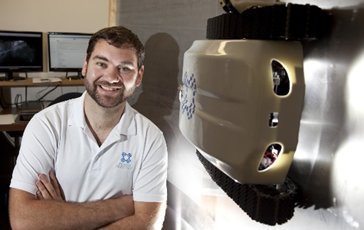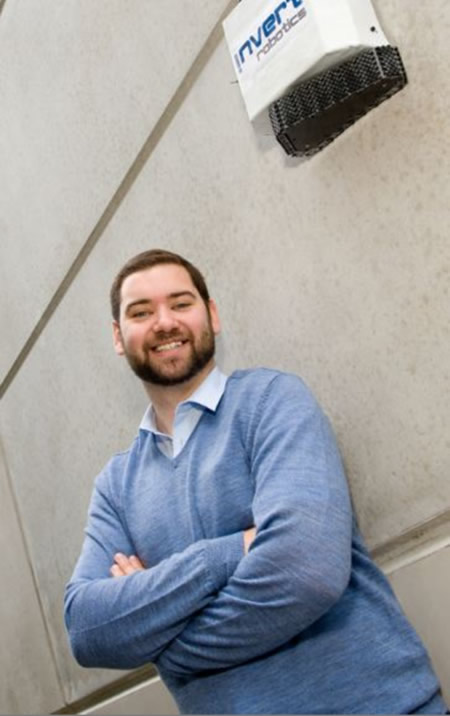Robots rove where humans fear to tread
Wall climbing robots provide a faster, simpler, safer way to inspect industrial stainless steel tanks, silos and dryers.
The opportunity
Stainless steel storage tanks, pressure vessels, boilers and pipelines, which make up the bulk of industrial infrastructure in diary processing plants, petrochemical plants, refineries and pulp and paper mills, share one thing in common: they’re prone to cracking near weld seams.
In raw milk storage tanks or milk powder silos, bacterial colonisation of cracks can result in contamination of products and must be prevented by repairing cracks as they occur. Leaks in petrochemical storage tanks and pressure vessels storing fuels such as LPG corrosion hold the potential for major environmental, safety and economic hazards. Regular checks and maintenance are a necessity in order to meet stringent health and safety obligations.

- PreSeed Accelerator Funding for early-stage development

Historically, finding and repairing cracks within dairy tanks and silos is achieved by teams of abseilers who rig trusses inside tanks and perform naked eye visual inspections using torch light. Milk powder silos or driers can contain toxic gases which are harmful to humans. The significant safety hazards, quality control issues, and equipment and labour requirements associated with this technique make tank inspections an expensive and risky prospect for dairy processors. In addition, all dairy processing plants maintenance must be performed within a narrow timeframe to ensure maximum operational uptime.
The sheer size and quantity of petrochemical storage tanks means inspection for this industry is an expensive and lengthy process too. Ultrasonic thickness (UT) inspection of a tanks shell is performed while the tank is in-service to determine its rate of corrosion. Internal inspections are performed by emptying and venting tanks and sending personnel in to manually test tank bottoms using UT and Mag-Particle techniques.

Innovation in action
Motivated to make tank inspection faster, easier and safer, multi-award winning company, Invert Robotics, has developed a revolutionary new wall climbing robot. It can inspect petrochemical tanks both internally and externally, feeding data to a control station which is positioned outside of the equipment. The accuracy achieved is such that cracks invisible to the naked eye can be detected in a fraction of the time manual checking takes. By including advanced equipment such as Ultrasonic Thickness Probes and Eddy Current Probes to their robot platform, Invert Robotics can also significantly increase the accuracy of inspections.
Since the need for inspection teams to work in hazardous areas is eliminated, monitoring of confined spaces and all associated OSH permits for hazardous work are no longer required, saving time and effort during preparation for an inspection and maintenance.
The client is issued with a detailed report including photographic records of defects, an estimate of the length, width and depth of each defect and the location of each defect within the equipment. Maintenance professionals can accurately assess each defect and determine whether repair is necessary.
Invert Robotics has successfully completed its first job inspecting a milk powder dryer for Westland Milk Products. The processing plant in Hokitika is used to produce milk powders, proteins, fats, nutritional and bio-active products. After many field trials Invert Robotics is stoked to launch the service and get this first job under their belt.
For Invert, this validates the technology and provides evidence that their stainless steel robotic inspection service is safer, faster and more accurate than existing inspection services. The company is extremely excited about entering the commercial arena and continues to focus on developing the dairy inspection market.
An award winning solution, delivered in partnership
Invert Robotics was named the winner of the Ministry of Science & Innovation Start-up Award at the 2012 HiTech Awards for its remote controlled wall-climbing robot. Other accolades include winning the Champion Producer/Manufacturer, Small Enterprise category at the Champion Canterbury Business Awards and winning the ANZ Flying Start Business Plan Competition.
Invert Robotics is a spin-out from the University of Canterbury, backed by KiwiNet, a consortium of research institutes working together to better leverage their combined capability to achieve greater commercial outcomes for New Zealand.
Dr Nigel Johnson, Director of Research & Innovation at the University of Canterbury, says KiwiNet has not only provided critical investment through the Ministry of Innovation, Business and Employment’s PreSeed Accelerator Fund, the investment committee has also provided invaluable guidance on commercialisation pathways.
Invert Robotics received an investment of $118,000 from the MBIE’s Pre Seed Fund via KiwiNet, with matching funding from the University of Canterbury and powerHouse Ventures. The funding was used to develop robots for a broader range of applications than was previously possible.
Dr Nigel Johnson, Director of Research & Innovation at the University of Canterbury
